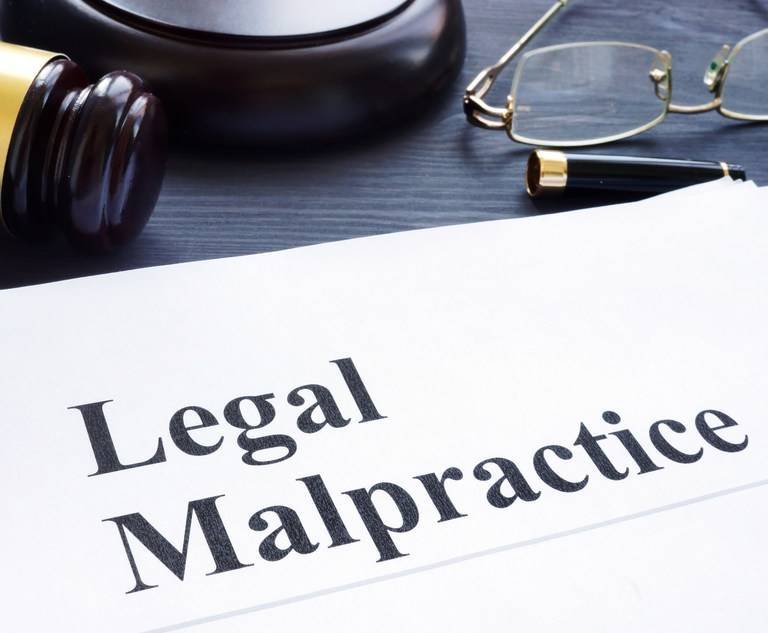Eighth Circuit Allows Legal Malpractice Claim Seeking 'Corrective Attorney Fees' To Move Forward
In the face of no controlling Arkansas case law on the matter, the Eighth Circuit made an "Erie-educated guess" as to what the Arkansas Supreme Court would do and held that Gerber could still establish proximate cause despite there being no resolution to the underlying case.
April 25, 2022 at 10:00 AM
5 minute read
 In Gerber Products Company v. Mitchell Williams Selig Gates & Woodyard, PLLC, No. 20-2912 (8th Cir. March 11, 2022), the district court granted summary judgment in favor of law firm Mitchell Williams Selig Gates & Woodyard, PLLC, dismissing Gerber Products Company's claim for legal malpractice because Gerber could not show that it was entitled to "corrective attorney fees"
In Gerber Products Company v. Mitchell Williams Selig Gates & Woodyard, PLLC, No. 20-2912 (8th Cir. March 11, 2022), the district court granted summary judgment in favor of law firm Mitchell Williams Selig Gates & Woodyard, PLLC, dismissing Gerber Products Company's claim for legal malpractice because Gerber could not show that it was entitled to "corrective attorney fees"  incurred while attempting to fix Mitchell Williams' mistakes. The Eighth Circuit reversed and remanded, holding that, so long as Gerber could establish that Mitchell Williams' negligence proximately caused Gerber to incur the corrective fees, Gerber's claim could move forward.
incurred while attempting to fix Mitchell Williams' mistakes. The Eighth Circuit reversed and remanded, holding that, so long as Gerber could establish that Mitchell Williams' negligence proximately caused Gerber to incur the corrective fees, Gerber's claim could move forward.
Background and Underlying Litigation
Gerber hired Mitchell Williams to defend it in a lawsuit in Arkansas state court. During the early phases of discovery, Gerber produced 2,700 pages of documents, some of which turned out to be privileged. Gerber was able to claw those documents back, and promised to produce a privilege log. Gerber later produced 96,000 pages of documents in response to an unopposed motion to compel, but did not produce a privilege log. After producing several thousand more pages, Gerber provided an eight-page privilege log. In response to yet another motion to compel, Gerber made a final production and included a revised privilege log that was 13 pages long.
Opposing counsel in the state-court matter argued that Gerber had waived its attorney-client privilege by failing to invoke it in time, by producing privileged documents, and by providing an incomplete privilege log. The state district court denied Gerber's motion for protective order, after which Gerber replaced Mitchell Williams with new counsel.
Gerber's new counsel attempted to remedy the waiver situation. It filed an interlocutory appeal on Gerber's behalf, but the Arkansas Court of Appeals affirmed the district court's decision to deny a protective order. Thereafter, Gerber sued Mitchell Williams and one of its attorneys in federal court alleging legal malpractice and seeking to recover more than $75,000 it spent in corrective attorney fees attempting to fix the firm's mistakes.
Mitchell Williams moved for summary judgment on Gerber's legal malpractice claims, arguing that the statute of limitations barred Gerber's claims and that Gerber could not establish that Mitchell Williams' negligence proximately caused any injury to Gerber. The District Court denied summary judgment on the statute-of-limitations grounds, but granted summary judgment on the grounds that Gerber could not establish proximate cause. In effect, the district court held that Gerber had a different timing issue: Under Arkansas law, proof of proximate cause on a legal malpractice claim requires a plaintiff to show that "but for the negligence of the attorney, the result in the underlying action would have been different." Barnes v. Everett, 95 S.W.3d 740, 744 (Ark. 2003). Because the underlying suit in which Mitchell Williams first represented Gerber was not yet over, Gerber could not show that the result of the underlying suit would have been different but for Mitchell Williams' conduct.
After an 'Erie'-Educated Guess, the Eighth Circuit Reverses and Remands
On appeal, the Eighth Circuit reversed and remanded. In the face of no controlling Arkansas case law on the matter, the court made an "Erie-educated guess" as to what the Arkansas Supreme Court would do and held that Gerber could still establish proximate cause despite there being no resolution to the underlying case.
In doing so, the Eighth Circuit first examined proximate cause under Arkansas law, which is defined as "that which in a natural and continuous sequence, unbroken by any efficient intervening cause, produced the injury, and without which the result would not have occurred." City of Caddo Valley v. George, 9 S.W.3d 481, 487 (Ark. 2000) (emphasis omitted). The typical scenario in a legal malpractice suit involves a party that loses and then blames its attorney. Thus, for a legal malpractice claim—in which the plaintiff must show an unbroken causal chain between a lawyer's negligence and the plaintiff's injury—the merits of the underlying case become a part of the proof of the malpractice case, creating a case within a case. Yet, in Gerber's situation, there was no case within a case because its "injury" was not a loss in the underlying suit, but rather the legal fees it incurred seeking (ultimately, unsuccessfully) to regain its attorney-client privilege after Mitchell Williams negligently waived it.
The Eighth Circuit determined this was not an issue, relying on the Restatement (Third) of the Law Governing Lawyers §53. The court reasoned that it made sense that "proving a case-within-a-case is not a hard-and-fast requirement because an attorney's negligence can result in injuries other than a loss in court." And although the Arkansas Supreme Court had not weighed in on the issue, the Eighth Circuit noted that most of the courts to have addressed this scenario—including those in Alaska, California, Illinois, Maryland, New York, North Dakota, and Ohio—had relaxed the case-within-a-case requirement and held that corrective fees are available even without an underlying judgment. Therefore, so long as Gerber could show that Mitchell Williams' negligence led, in an unbroken chain of causation, to Gerber incurring the extra fees, Gerber could succeed on its claim.
Judge Erickson's Concurring and Dissenting Opinion
The decision was not unanimous, as Judge Erickson issued an opinion concurring and dissenting. Judge Erickson wrote that, given the importance of the issue but the absence of controlling Arkansas case law, he would have certified the question to the Arkansas Supreme Court. Absent certification, Judge Erickson would have deferred to the state district court's decision following the case-within-a-case requirement and holding that corrective fees were not available to Gerber at this point. Judge Erickson noted that he believes the district court sitting in Arkansas "is a better predictor of Arkansas law than we are." If, however, the Arkansas Supreme Court relaxed the case-within-a-case requirement, Judge Erickson concurred with the majority's analysis of the issues.
Emily M. McAdam is an attorney at Greene Espel PLLP.
NOT FOR REPRINT
© 2025 ALM Global, LLC, All Rights Reserved. Request academic re-use from www.copyright.com. All other uses, submit a request to [email protected]. For more information visit Asset & Logo Licensing.
You Might Like
View All

Processes, Challenges and Solutions In Lateral Partner Integration

Empowering Your Lawyers: A Marketing Team’s Guide to Achieving Goals and Fostering Lawyer Satisfaction
9 minute read
Change Is Coming in the Trump Era. For Big Law, Change Is Already Here
6 minute readLaw Firms Mentioned
Trending Stories
Who Got The Work
J. Brugh Lower of Gibbons has entered an appearance for industrial equipment supplier Devco Corporation in a pending trademark infringement lawsuit. The suit, accusing the defendant of selling knock-off Graco products, was filed Dec. 18 in New Jersey District Court by Rivkin Radler on behalf of Graco Inc. and Graco Minnesota. The case, assigned to U.S. District Judge Zahid N. Quraishi, is 3:24-cv-11294, Graco Inc. et al v. Devco Corporation.
Who Got The Work
Rebecca Maller-Stein and Kent A. Yalowitz of Arnold & Porter Kaye Scholer have entered their appearances for Hanaco Venture Capital and its executives, Lior Prosor and David Frankel, in a pending securities lawsuit. The action, filed on Dec. 24 in New York Southern District Court by Zell, Aron & Co. on behalf of Goldeneye Advisors, accuses the defendants of negligently and fraudulently managing the plaintiff's $1 million investment. The case, assigned to U.S. District Judge Vernon S. Broderick, is 1:24-cv-09918, Goldeneye Advisors, LLC v. Hanaco Venture Capital, Ltd. et al.
Who Got The Work
Attorneys from A&O Shearman has stepped in as defense counsel for Toronto-Dominion Bank and other defendants in a pending securities class action. The suit, filed Dec. 11 in New York Southern District Court by Bleichmar Fonti & Auld, accuses the defendants of concealing the bank's 'pervasive' deficiencies in regards to its compliance with the Bank Secrecy Act and the quality of its anti-money laundering controls. The case, assigned to U.S. District Judge Arun Subramanian, is 1:24-cv-09445, Gonzalez v. The Toronto-Dominion Bank et al.
Who Got The Work
Crown Castle International, a Pennsylvania company providing shared communications infrastructure, has turned to Luke D. Wolf of Gordon Rees Scully Mansukhani to fend off a pending breach-of-contract lawsuit. The court action, filed Nov. 25 in Michigan Eastern District Court by Hooper Hathaway PC on behalf of The Town Residences LLC, accuses Crown Castle of failing to transfer approximately $30,000 in utility payments from T-Mobile in breach of a roof-top lease and assignment agreement. The case, assigned to U.S. District Judge Susan K. Declercq, is 2:24-cv-13131, The Town Residences LLC v. T-Mobile US, Inc. et al.
Who Got The Work
Wilfred P. Coronato and Daniel M. Schwartz of McCarter & English have stepped in as defense counsel to Electrolux Home Products Inc. in a pending product liability lawsuit. The court action, filed Nov. 26 in New York Eastern District Court by Poulos Lopiccolo PC and Nagel Rice LLP on behalf of David Stern, alleges that the defendant's refrigerators’ drawers and shelving repeatedly break and fall apart within months after purchase. The case, assigned to U.S. District Judge Joan M. Azrack, is 2:24-cv-08204, Stern v. Electrolux Home Products, Inc.
Featured Firms
Law Offices of Gary Martin Hays & Associates, P.C.
(470) 294-1674
Law Offices of Mark E. Salomone
(857) 444-6468
Smith & Hassler
(713) 739-1250








